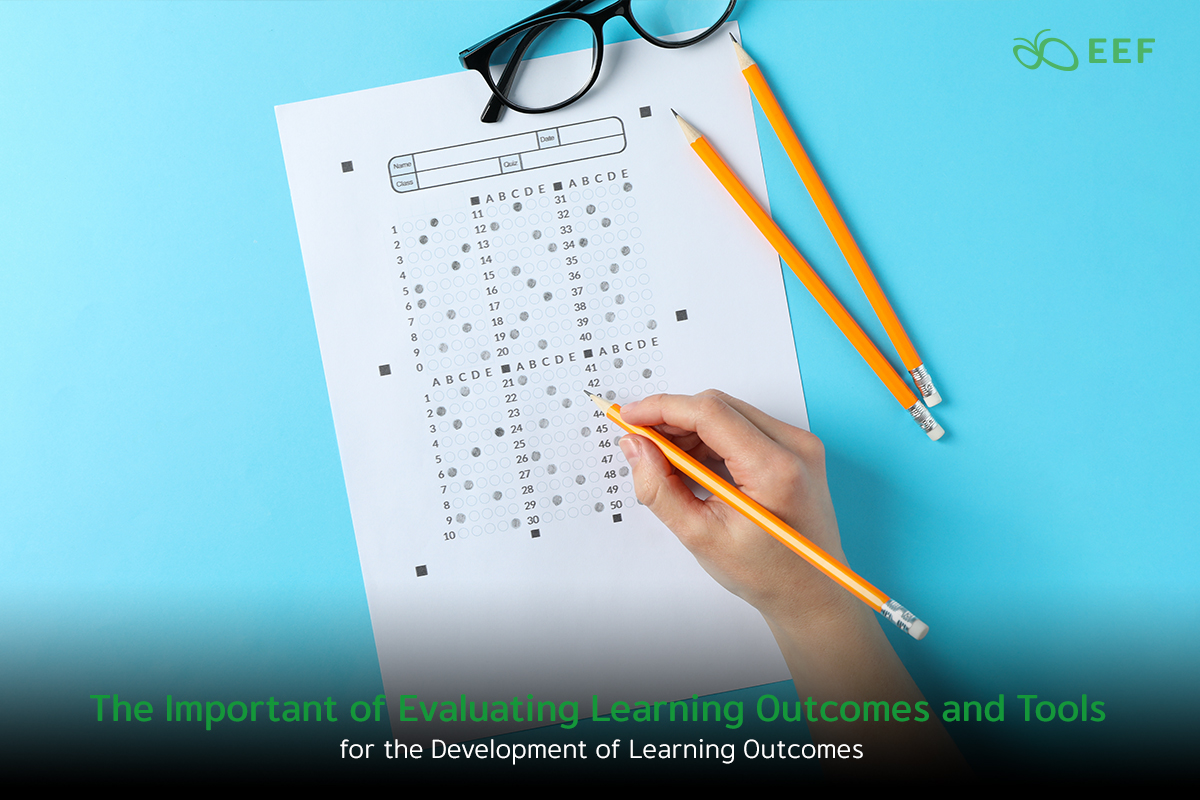
The value of learning outcomes assessments
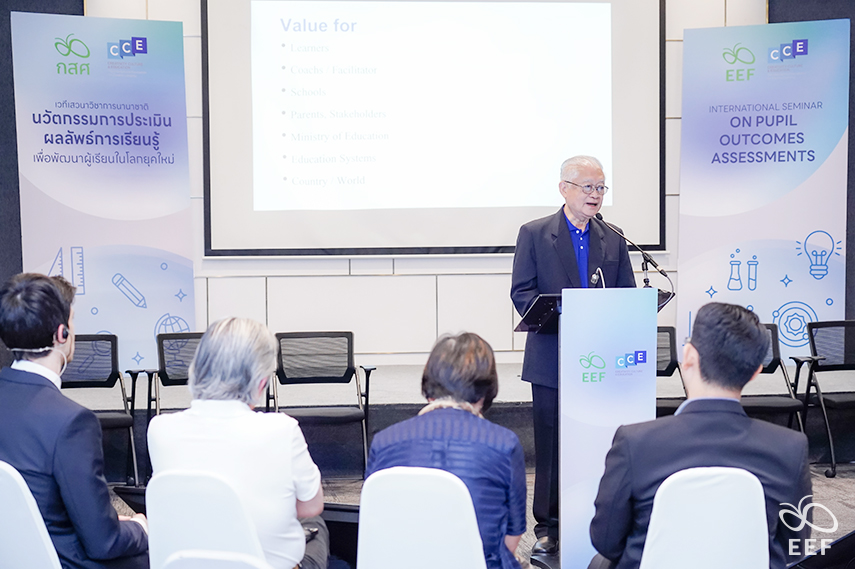
Prof. Vicharn Panich, Advisor to Equitable Education Fund’s Board of Governance
Prof. Vicharn Panich gave an unconventional view on the value of outcome assessment. The student’s learning outcome is a means which is a tool to feed forward to all relevant parties to adjust their work or responsibilities and an end where we find out the grades of the student. The value of learning outcomes as a means of transformation and improvement is often overlooked in the Thai education system. The overall view on how the learning outcome benefits the students and other stakeholders, such as parents, teachers, facilitators, Ministry of Education (MoE), etc., must be considered to get the full perspective. The core of the value of learning outcomes is in evaluating V.A.S.K (Value, Attitude, Hard & Soft Skills, Knowledge) along with the foundation of the ability to gain knowledge and the ability of executive functions. The Thai education system lacks in measuring V or value, which has affected the Quality of Thai people in terms of self-belief and the belief in goodness, living the path of righteousness towards oneself, others, and society.
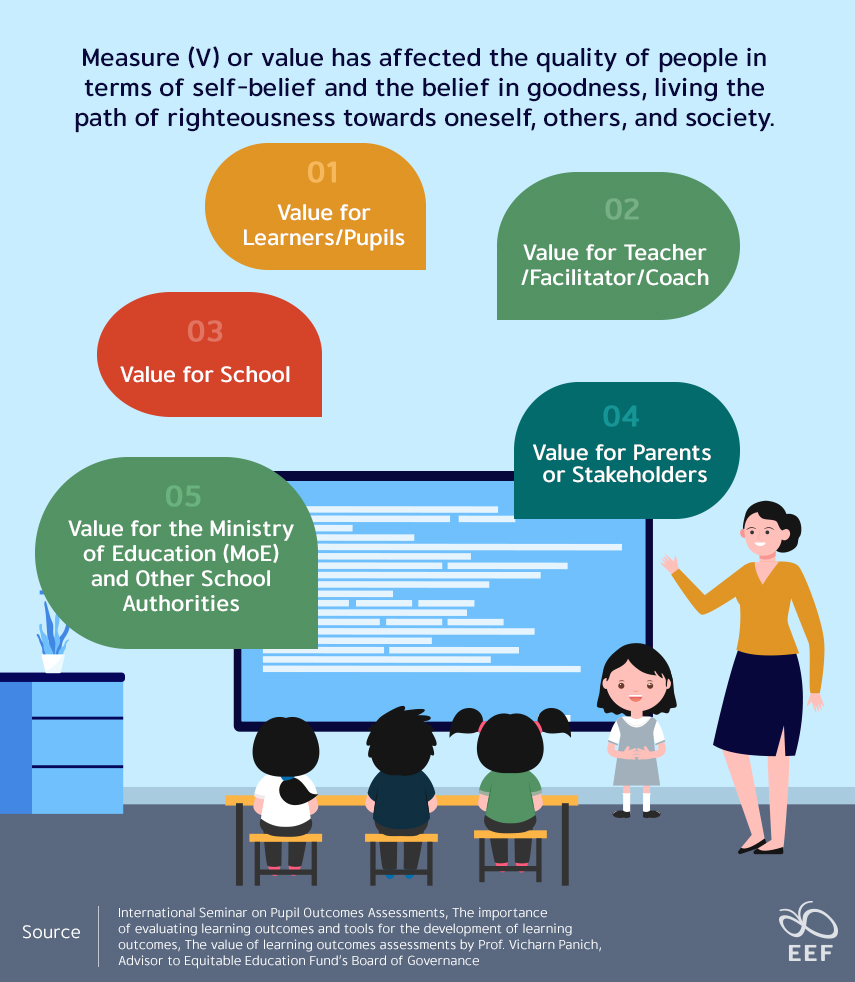
Value for Learners/Pupils: The three essential assessments that educators must consider are Assessment as Learning (AaL) which is learning how to assess oneself and peers; Assessment for Learning (AfL) which is a formative assessment and constructive feedback to help pupils learn and Assessment of Learning (AoL) which is a summative evaluation (important in the Thai education system)
Value for Teacher/Facilitator/Coach: Teachers should have opportunities for continuous learning to improve themselves, and student assessments and observations can serve as feedback for their growth. Assessment outcomes should inform teaching practices and promote professional development through professional learning communities (PLCs). Experiential learning and continuous quality improvement (CQI) can help elevate the quality of teaching.
Value for School: Schools must be a learning organization with information as feedback or feed-forward to drive the learning loop of the organization. How many learning organizations out of the 35,000 schools in Thailand? Our education system will be elevated if we support the dimension of learning integrated into the schools. PLC is an important tool to elevate the education system quality of schools and how the school members improve and learn. Stakeholders in education quality also need to be able to engage in learning as a continuous learning ecosystem is required in a student’s life. PLC will drive the school’s learning loop, called Developmental Evaluation (DE), and involve communities, parents, and other stakeholders.
Value for Parents or Stakeholders: Parents get feedback to improve themselves and the learning ecosystem at home, in the community, and in the social media environment to enhance the facilitation of the kids. Stakeholders should have mechanisms to unite to elevate education systems, support schools and serve as co-educators, as new-generation learning is not limited to school boundaries.
Value for Ministry of Education (MoE) and other school authorities: The central system must be a learning organization with education systems research to find the depth of information to feed forward to the authorities leading to systems transformation. The authorities should transform their systems through education systems research and multiple-loop learning to adapt to current times. Teachers and students must be central to the learning outcome, aligned with the World Development Report 2018. The education system must focus on learning outcomes that lead to transforming the system, and understanding the system’s outcomes is crucial in the context of Thailand.

In conclusion, the value of learning outcomes is not limited to students but involves everyone in the loop to feed forward into learning and improvement cycles. The learning outcome must include V in the VASK as a society could have problems if people lose out on values and ethics. Thai people must find value in themselves to be valuable to Thailand and the world. The rules and regulations must be standardized amongst all the 35,000 schools in Thailand, requiring feedback to change the systems. Systems research is needed to investigate the learning outcome to identify all aspects of VASK, enabling systems improvements, not just elevating on a school-by-school basis.
Making the most of assessment data: pursuing evidence-based policies & practices.
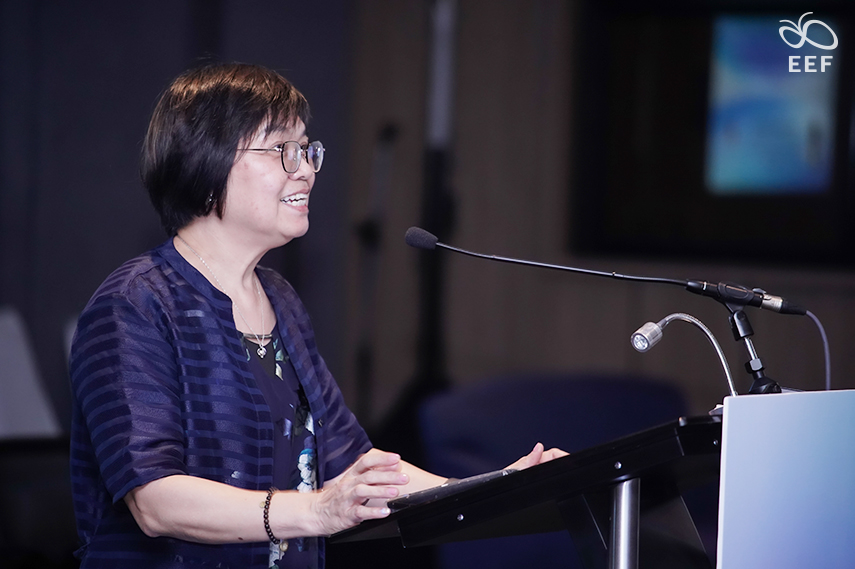
Prof. Esther Ho Sui-chu, Director of Hong Kong Centre for International Student Assessment,
Department of Education Administration & Policy, The Chinese University of Hong Kong
Student Learning Assessment (SLA): Students’ learning outcomes can be assessed by attending local or international seminars and observing students. Moreover, it can determine how meaningful learning is to students and teachers and whether they can utilize what they learn. The different levels of SLA in Hong Kong also include assessing children’s behavioral skills as specific criteria will affect a child’s learning, such as how they feel emotionally and physically. The strengths and weaknesses of the school in comparison to other schools in the cities and the region can be identified if assessment models are in place. Evaluation tools were constructed when Hong Kong reverted to Chinese rule, and many parties ensured the survey was conducted to serve its purpose. The reform since the year 2000 nurtures lifelong learners in the Hong Kong education system to construct a system conducive to lifelong learning and the overall development of students.
UNESCO published the student learning assessment book, which shows that every country has different education tiers and international benchmarking outcomes such as TIMSS, PIRLS, PISA, and HBSC. For Hongkong, these institutions are responsible for different assessments and will give feedback on the education system. Moreover, in Hong Kong, information is gathered locally through national assessments by the Hong Kong Examination and assessment authority, school-based assessments, and school-level monitoring systems involving students, parents, and teachers.
At the national level, The Hong Kong Public Examination serves as a certification and selection process for students, with value-added measures introduced in 2000. Teachers are responsible for their subjects’ improvement and accountability, and the value-added measures do not consider other cognitive outcomes, such as students’ well-being. There should be measures for teachers to engage students who need extra help without additional charges, and continuous assessment should be implemented for each subject at the school level. The formative assessment is used for the school-based evaluation in Hong Kong.
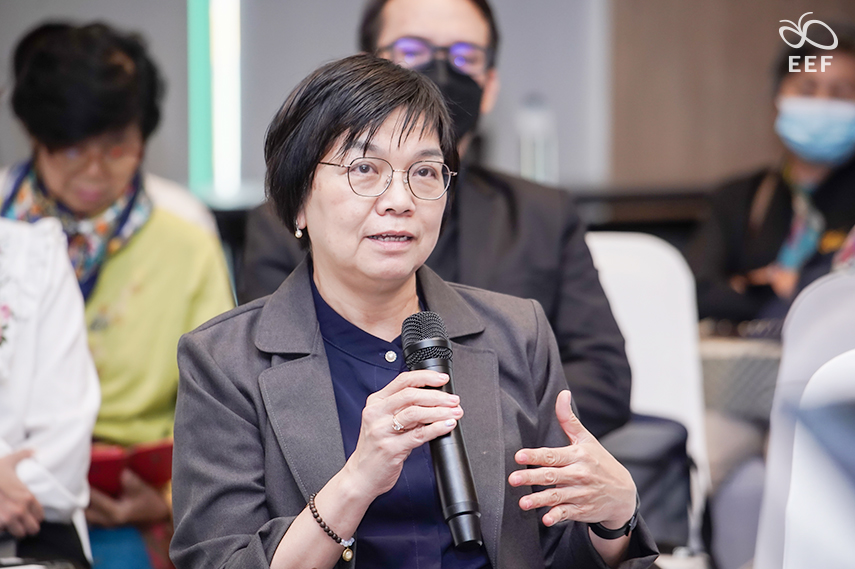
In Hong Kong’s school-level monitoring system, the input, process, and output model is implemented, with feedback from parents, teachers, and stakeholders about management effectiveness and curriculum assessment. Academic and non-academic performance instruments are used to monitor student performance.
The PISA (Program for International Student Assessment) is an international assessment project initiated by the Organizations for Economic Co-operation and Development OECD, assessing student literacy in reading, math, and science every three years. The project also includes a contextual questionnaire for students, parents, and teachers, with the key concept of equality operationalized through the socio-economic gradient. Each country has its socio-gradient to indicate equality in an educational system using the PISA index.

Another assessment indicator adopted is the HSBC (Health Behavior in school-aged children) measure initiated by WHO, participated by over 40 countries with interesting findings. Children’s health and well-being are becoming major policy concerns in many countries. According to the WHO, health is a state of complete physical, mental, and social well-being, highlighting health’s multi-faceted nature. For Hong Kong, the field trial of HSBC finished in 2018, and the main study was successfully done in 2020. This project’s findings inform the well-being policy of school-aged children and inspire the new direction of school improvement practices. Using the HSBC data, educators and researchers have been informed about improving students’ well-being. A conceptual framework has been developed to illustrate how family communication and support, student engagement in school, teacher collaboration, and student background impact education outcomes. Health and well-being measures are also important predictors of student success. International assessments can rank and improve essential education quality and equity across continents, focusing on literacy, competency, health and well-being, and school effectiveness. The use of international assessments to inform education policies and practices includes enhancing school segregation – desegregation policy, promoting parent involvement, and promoting health literacy of teachers, parents, and students.
Source:
Record of the Conference: Here
Section 1:
International Seminar on Pupil Outcomes Assessments, The importance of evaluating learning outcomes and tools for the development of learning outcomes, The value of learning outcomes assessments by Prof. Vicharn Panich, Advisor to Equitable Education Fund’s Board of Governance
Section 2:
International Seminar on Pupil Outcomes Assessments, The importance of evaluating learning outcomes and tools for the development of learning outcomes, Making the most of assessment data: pursuing evidence-based policies & practices by Prof. Esther Ho Sui-chu, Director of Hong Kong Centre for International Student Assessment, Department of Education Administration & Policy, The Chinese University of Hong Kong.

